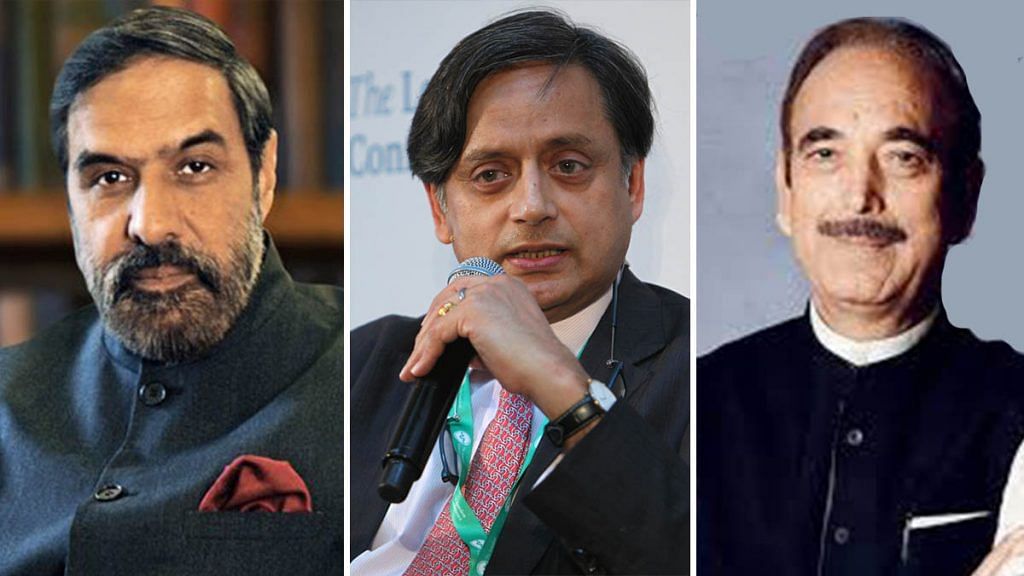New Delhi: Congress working president Sonia Gandhi has constituted three five-member party committees — on economic affairs, foreign affairs and national security — with former PM Manmohan Singh as a member of each.
The party announced the formation of the committees and their members Friday. At least four of the 23 signatories to the controversial August letter seeking a leadership change in the party have been made members of the committees — Anand Sharma and Shashi Tharoor in the foreign affairs committee, and Ghulam Nabi Azad and Veerappa Moily in the national security committee.
Former finance and home minister P. Chidambaram, who had questioned the party’s performance in the Bihar assembly polls, has been made a member of the committee on economic affairs.
Chidambaram had also expressed concern over the party’s performance in the Madhya Pradesh, Gujarat, Uttar Pradesh and Karnataka bypolls, saying it reflects that the Congress “has no organisational presence on the ground or has been weakened considerably”.
The committees, sources in the party said, have been formed with an aim to streamline the process of the party deciding its position on various issues of national importance, after the Congress was seen struggling to speak in one voice on issues such as Article 370.
Also Read: Can’t deny top Congress leadership inaccessible — Aiyar, Chacko, Shastri back letter to Sonia
Panels and their members
Jairam Ramesh has been appointed as convenor of the economic affairs committee. Other members of the panel include Malikarjun Kharge and Digvijaya Singh.
Kharge had Thursday come out in support of the party leadership amid the criticism it has faced in light of the Bihar elections, saying some members are “weakening the party from within” by questioning the leadership.
The committee of foreign affairs will be headed by former external affairs minister Salman Khurshid. Other members are Saptagiri Ulaka, Singh, Sharma and Tharoor, who served as junior foreign minister during the UPA government.
The national security committee will be headed by Vincent H. Pala, Lok Sabha MP from Shillong. Pala has previously served as the MoS for Water Resources and MoS of Minority Affairs during UPA-I.
The other members of the committee include former Puducherry CM V. Vaithilingam, Azad and Moily.
Azad, who is currently the leader of the opposition in Rajya Sabha, has earlier served as Union minister for health, while Moily has had a stint as Karnataka chief minister, and Union minister of petroleum, as well as corporate affairs.
Dissonance in Congress
The formation of the committees follows what appeared to be dissonance within the party on articulating its stand on issues such as scrapping Article 370 and India’s decision to opt out of the Regional Comprehensive Economic Partnership (RCEP) agreement.
Last year, in November, after the Modi government opted out of signing the agreement, the Congress claimed credit for successfully pressurising the government to do so, saying it didn’t deem the RCEP favorable for India.
However, of late, party leaders have spoken in different voices on the issue, with Anand Sharma calling the move “unfortunate and ill-advised” and Jairam Ramesh defending the party’s earlier stand against RCEP. Chidambaram, meanwhile tweeted that there are “pros and cons to India joining the RCEP” and hit out at External Affairs Minister S. Jaishankar for having “railed against trade agreements and praised the virtues of protectionism”.
Similarly, while the Congress released a resolution in August last year criticising the manner in which Article 370 was scrapped, it never explicitly demanded its restoration. Chidambaram became the first leader to make that demand in so many words, in October this year. He had also strongly criticised the decision in Parliament in its immediate aftermath.
Also Read: Letter politics at CWC meet — who said what in Congress over leadership change
